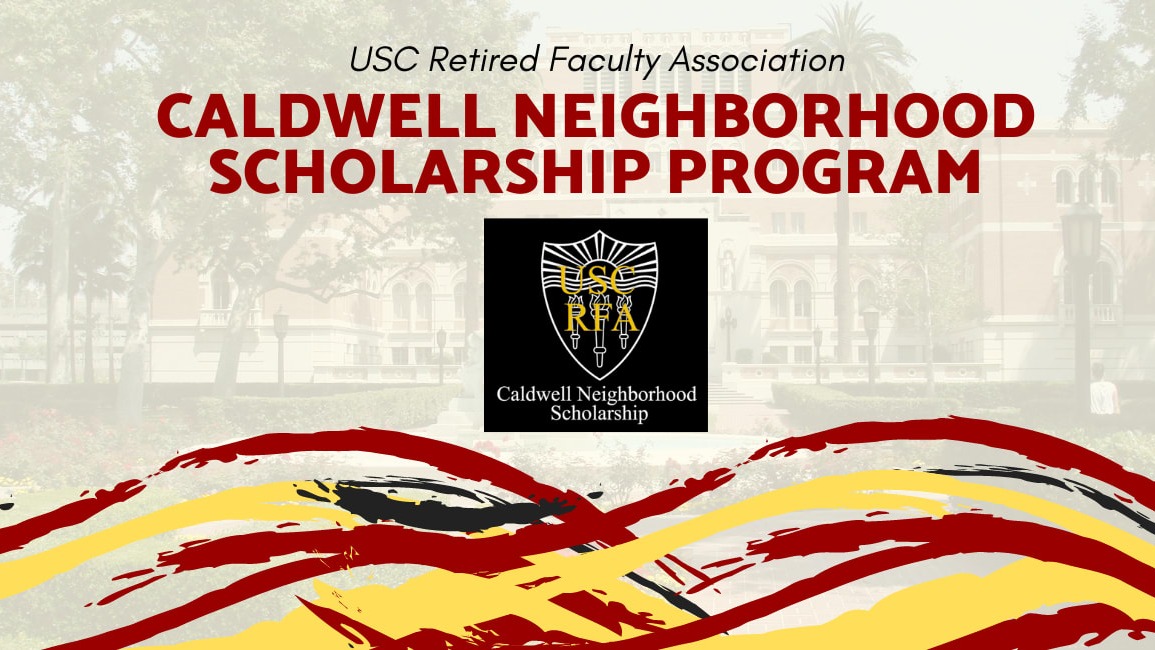USC Russell L. Caldwell Neighborhood Scholarship

The Russell L. Caldwell Neighborhood Scholarship Program was born out of the tumultuous decade of the 1960s that sparked dramatic transformations in higher education. Strident voices from communities across urban America challenged universities to mix and match the underserved with the well-served and the educationally disenfranchised with the franchised to make real our nation’s longstanding mantra that access to higher education is instrumental in guiding all Americans toward a more productive and prosperous future.
Legacy of Kindness
For almost 60 years, the Caldwell Scholarship has served high-achieving local students as the first faculty-initiated community scholarship. Funded by faculty and staff retirees with the support of the USC Office of Financial Aid, the group has supported over 450 students.
It began in December 1965, shortly after the Watts Rebellion. The late Prof. Russell Caldwell, then president of the USC Faculty Association, asked his colleagues to support a new commitment to strengthen bonds between USC and the neighborhood. Faculty were challenged to choose small payroll deductions to fund scholarships. That work has grown into the scholarship that currently honors him with its name. Criteria for selection include leadership, initiative, academic achievement, and community service.
New Scholars
John Recendez came to USC from Dorsey High, where he earned an Honor Roll Award for maintaining a 4.0 for three years. He is a marathon runner, an award-winning writer, a theater volunteer, a youth mentor, an intern at the Baldwin Hills Greenhouse Program, and more.
John intends to be a business administration major, with an emphasis in marketing, so he can achieve his career goal of working in marketing analytics or as a marketing manager overseas. He expressed gratitude for the Caldwell Scholarship, “Not only with the obvious financial contribution, but it’s a huge network of alumni… And that’s the thing I’m most looking forward to, being able to network and work with those students and faculty.”
As it does with every first-year student, the work of university life has presented challenges for him that he is eager to take on: “The biggest thing that I’ve had to adjust to is the class times, having big gaps in my schedule and deciding what to do with those gaps in my schedule. In high school, it’s a lot more loose – you do your work when you feel like it or when you have time – but over here you need to cut out sections of your day in order to dedicate to certain things and I think that’s been the hardest part.”
Natalia Carrillo came to USC from Foshay Learning Center, where she was recognized with the Superintendent’s High Honor Roll. Having come to the U.S. from El Salvador, she recently marked seven years in the United States. At Foshay, she was active in the music department and tutored recent student immigrants in English, creating her own Zoom tutoring program to expand her impact.
Passionate about international affairs and deeply invested in the power of education, her goal is to give back: “I hope I can one day either work for the United Nations or get my PhD, if possible, and go back to Latin America and just try to build a better place for children there. My focus is building schools in Latin America.”
Her first-year experience has been exciting, and she is grateful for the fact that the Caldwell Scholarship is what allowed her to enroll at USC: “I was waiting for this moment… I’m studying what I wanted to… I’m very interested and excited to get into it more. The experience here has been amazing. I’ve met a lot of people and I feel like I can finally be me.”
To learn more about the USC Retired Faculty Association’s Caldwell Neighborhood Scholarship Program, visit:
https://emeriti.usc.edu/programs/caldwell-scholarsh
USC Russell Caldwell Educational Enrichment Fund
This endowment supports student educational experiences such as conferences, seminars, workshops, educational travel opportunities, professional association fees, and more (outside of the USC tuition, housing, meal plan, and other fees).
